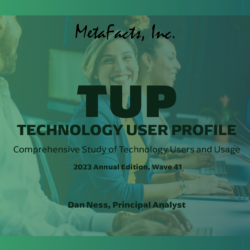How loyal are customers to their operating systems?
This TUPdate reports on market penetration status of broad technology ecosystems—that is, how loyal (or not) customers are when it comes to their operating system. In this analysis, MetaFacts measures the market’s adoption of the three prominent operating system families: Microsoft Windows, Google Android/Chrome OS, and Apple iOS/iPadOS/MacOS.
PCs for work before and through the pandemic [TUPdate]
Working remotely from a personal computer is not a new phenomenon—and it took hold long before the pandemic. Most home PCs have already been allocated to work-related activities, but the type of work differs, and has been shifting since the pandemic caused a larger variety of workers to stay at home.
This TUPdate reports on the penetration of home PCs among employees, which activities employees use their home PCs for, the prominence of work-provided PCs, the age of the home PC-using employee, and work-from-home status. It measures online adults in the US, Germany, UK, and Japan in 2019 and 2020.
Will youthful enthusiasm drive new technology adoption? [TUPdate]
How much of a factor does age play in technology adoption and use? Are tech trends among younger generations a sign of what’s to come?
This TUPdate investigates the differences and similarities among age groups regarding which technology devices people use, how new those devices are, and how they use them. The online adults measured in this report range from ages 18-24, 25-34, 45-54, 55-64, and 65+ across the US, Germany, the UK, and Japan.
Brand footprints and ecosystems – market progress update [TUPdate]
Popularity may not matter much in life—but when it comes to device and ecosystem adoption—it can mean quite a lot.
This TUPdate measures brand footprint and ecosystem adoption by how many people are using its devices. Microsoft Windows ranks as the most successful technology ecosystem, while Google’s Android and ChromeOS devices, Facebook, Amazon, Apple’s ecosystem, and HP’s brand footprint also hold substantial penetration rates. This TUPdate reports on the progress of seven top ecosystems and brands in reaching market penetration using the wave of research from TUP/Technology User Profile 2020 across the US, Germany, the UK, Japan, China, and India.
Ecosystem combination concentration by country [MetaFAQs]
It may seem like a jungle out there, but each ecosystem has one dominant product type and at least one other product or combination of products making up its market base. So, which ecosystems have the most multi-product combinations?
This MetaFAQs reports on the concentration of products within the bases of Microsoft Windows and Xbox, Facebook networks or Portals, HP PCs or printers, Amazon shoppers and Alexa users, Apple iPhones, iPads, Watches, and Macs, Google Android/ChromeOS smartphones and tablets, and Samsung smartphones, PCs, and tablets. This report measures online adults in the US, Germany, the UK, Japan, China, and India from TUP/Technology User Profile 2020, which is TUP’s 38th annual.
Highest ecosystem combinations [MetaFAQs]
Which tech ecosystems have the most dedicated customers? Many tech ecosystems have customers who use multiple products from that ecosystem. Some adults use two or more Windows PCs, or an Apple iPhone and an iPad, for example.
This MetaFAQs reports on the concentration of same-family combinations of products among online adults using: Microsoft Windows and Xbox, Facebook networks or Portals, HP PCs or printers, Amazon shoppers and Alexa users, Apple iPhones, iPads, Watches, and Macs, Google Android/ChromeOS smartphones and tablets, and Samsung smartphones, PCs, and tablets. This report measures online adults in the US, Germany, the UK, Japan, China, and India from TUP/Technology User Profile 2020, which is TUP’s 38th annual.
Highest ecosystem combinations [MetaFAQs]
Which tech ecosystems are strongest? One measure of ecosystem strength depends on how many products online adults use within that system. While Microsoft and Facebook take the lead in many countries, that is not always the case.
This MetaFAQs reports on the use of two or more products or services by online adults spanning: Microsoft Windows and Xbox, Facebook networks or Portals, HP PCs or printers, Amazon shoppers and Alexa users, Apple iPhones, iPads, Watches, and Macs, Google Android/Chrome smartphones and tablets, and Samsung smartphones, PCs, and tablets. This report measures online adults in the US, Germany, the UK, Japan, China, and India from TUP/Technology User Profile 2020, which is TUP’s 38th annual.
Highest ecosystem penetrations [MetaFAQs]
All it takes is one—especially when it comes to joining an ecosystems or brand footprint. A basic measure of ecosystem strength or brand footprint is how many customers are using at least one of its products or services.
This MetaFAQs reports on the use of one or more products or services by online adults spanning: Microsoft Windows and Xbox; Facebook networks or Portals; HP PCs or printers; Amazon shoppers and Alexa users; Apple iPhones, iPads, Watches, and Macs; Google Android/ChromeOS smartphones and tablets; and Samsung smartphones, PCs, and tablets. This report measures online adults in the US, Germany, the UK, Japan, China, and India from TUP/Technology User Profile 2020, which is TUP’s 38th annual.
How old are home laptops? [MetaFAQs]
Between Apple, Google OS, and Windows notebooks–how old are home laptops? Is the average age of a home notebook PC much older among online adults in Japan than in Germany or the US? Are home MacBooks used longer than Windows laptops? How do Chromebooks stack up in longevity?
This MetaFAQs reports on the average age of home notebooks by operating system family and country. This report measures online adults in the US, Germany, the UK, Japan, China, and India from TUP/Technology User Profile 2020, which is TUP’s 38th annual.
Trends in PC form factor penetration [MetaFAQs]
Which PCs are the most widely used across the globe? How widely accepted are AiO (All-in-One desktop) and Mini PCs? How does their market penetration compare to laptops and tower desktops? How has this market penetration changed?
This MetaFAQs details the penetration of notebook/laptop PCs, tower desktop PCs, AiO PCs, and Mini PCs from 2017 through 2020 in the US, UK, Germany, and China.

